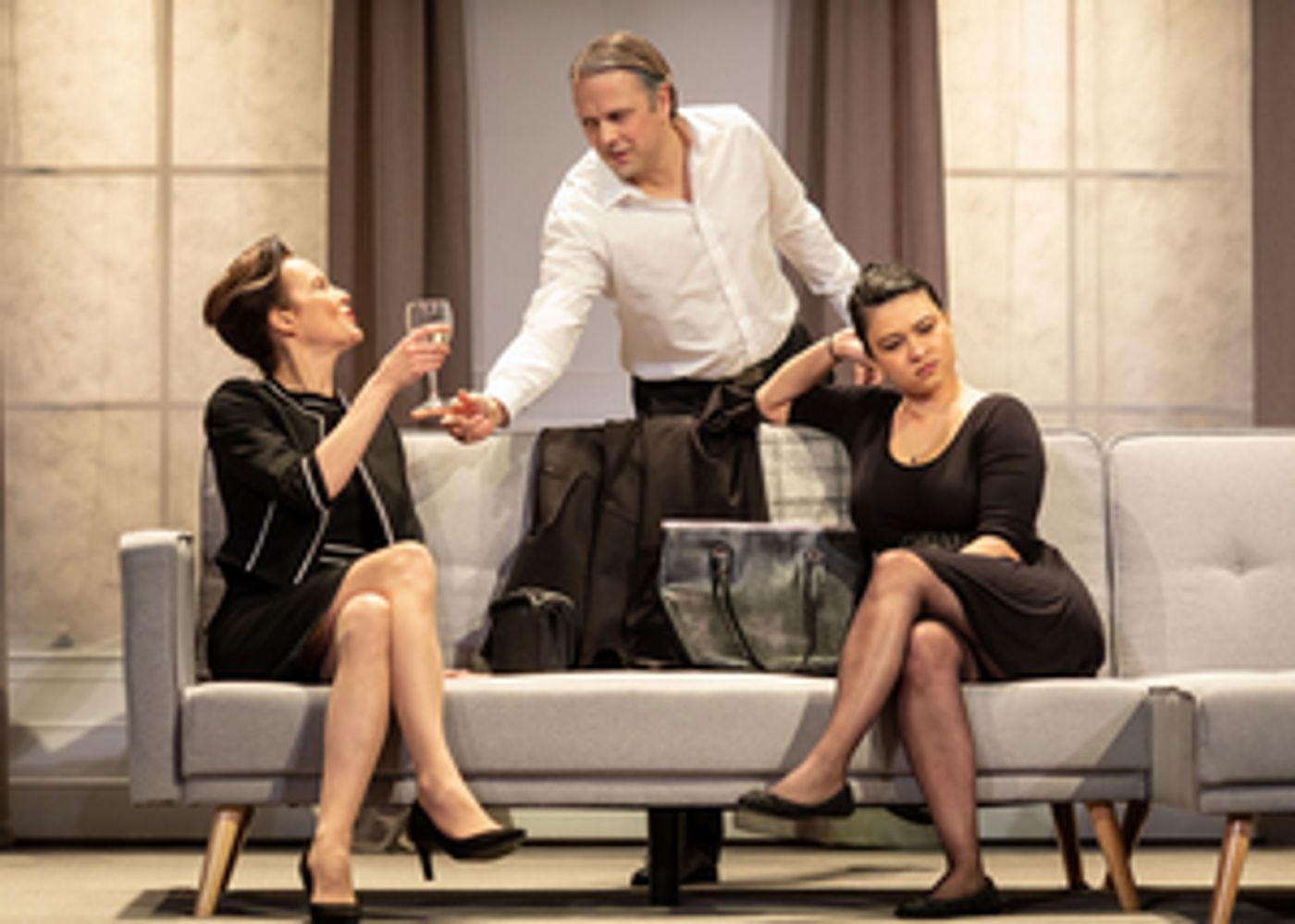Review: LOVE, LOVE, LOVE, Lyric Theatre Hammersmith

![]() It's all a bit Austin Powers for Oxford student Ken, hanging out at his so-straight brother's place in Swingin' London 1967. When hippy chick Sandra turns up for a meal with Henry - well, a smoke and a shag more likely - Ken cockblocks (as the young people say) his brother, because, well, because he can and she can. And so the new freedoms of the permissive society are shown to come at an emotional price.
It's all a bit Austin Powers for Oxford student Ken, hanging out at his so-straight brother's place in Swingin' London 1967. When hippy chick Sandra turns up for a meal with Henry - well, a smoke and a shag more likely - Ken cockblocks (as the young people say) his brother, because, well, because he can and she can. And so the new freedoms of the permissive society are shown to come at an emotional price.
Fast-forward to 1990, and Ken and Sandra are working hard, raising two children, and as self-obsessed as ever. The comforts of middle-class life abound, but there's an emptiness to the marriage and the kids know it. Joanna Scotcher's design tells us as much about the character arcs as their words and deeds - I could feel the claustrophobia all the way back in Row L.
The third act - after the second interval - takes Ken and Sandra into retirement, wealthy and complacent, narcissistically self-centred still, and the collateral damage now obvious. Empathy matters to everyone except those who have none to give - gasps in the house attested to its shocking absence.
Mike Bartlett's play may be ten years or so on from its Royal Court days, but Ken and Sandra have migrated into the mainstream. They're there on Question Time, week after bloody week, there on social media and clogging up the sewers of the Mail Online's comment threads and, crucially, they're there at the ballot box in numbers.
They're there with their tax-free pension lump sums, they're there with their two-thirds-empty, £1 million, mortgage-free, three-bedroom houses in Clapham, and they're there telling the youth that they don't work hard enough, so no wonder you can't afford your own studio flat.
I know - in many ways, I'm one of them.
The play is at its best as a state-of-the-nation analysis of generational conflict, an explanation for both Brexit's age-skewed voting patterns and the "Oh Jeremy Corbyn" chants at Glasto. That its relevance and bite have survived a tumultuous political decade is a testament to the writing.
It's also funny - Rachael Stirling is in great form as Sandra, trailing chaos behind her everywhere she goes, her voice growing more and more into late-period Margaret Thatcher in its condescending tone. She lands line after line and convinces as a teenager and as a skirt-suited boozy retiree that you really don't want to run into on a singles cruise.
Nicholas Burns's Ken is equally monstrous, "Sodding you" to anyone who falls within his orbit. Patrick Knowles as Henry has little more than a first-act cameo, but delivers his old-school working-class guy with pinched-lipped intensity.
Mike Noble has a lot of fun as teenage son, Jamie, and treads carefully on his return as a damaged thirtysomething, but Isabella Laughland is the standout. She stops just short of caricature as 16-year-old Rose, but gets to fire the shots as 37-year-old Rose and she doesn't miss many. She walks the narrow line between self-pity and evoking pity with real skill - though, these days, somebody will call "white privilege" and they may well be right.
It's a satire inhabited by grotesques, of course, but does it quite add up? Do you believe that Ken and Sandra could be both successful and quite so sociopathic? Probably outside the family unit, but to be such shits inside it too? Some of the conversations feel stretched - the point driving the dialogue rather than the dialogue driving the point. Perhaps it's wishful thinking, but it doesn't quite add up.
That's enough from me - I've got to go and spend some of that tax-free pension money, probably being served by a twentysomething on minimum wage and a zero hours contract, most of whose income goes on a shared overcrowded flat rented on a six-month lease.
And they're always on their expensive phones...
Love. Love, Love is at the Lyric Theatre Hammersmith until 4 April
Photo by Helen Maybanks
Reader Reviews
Powered by
|
Videos

